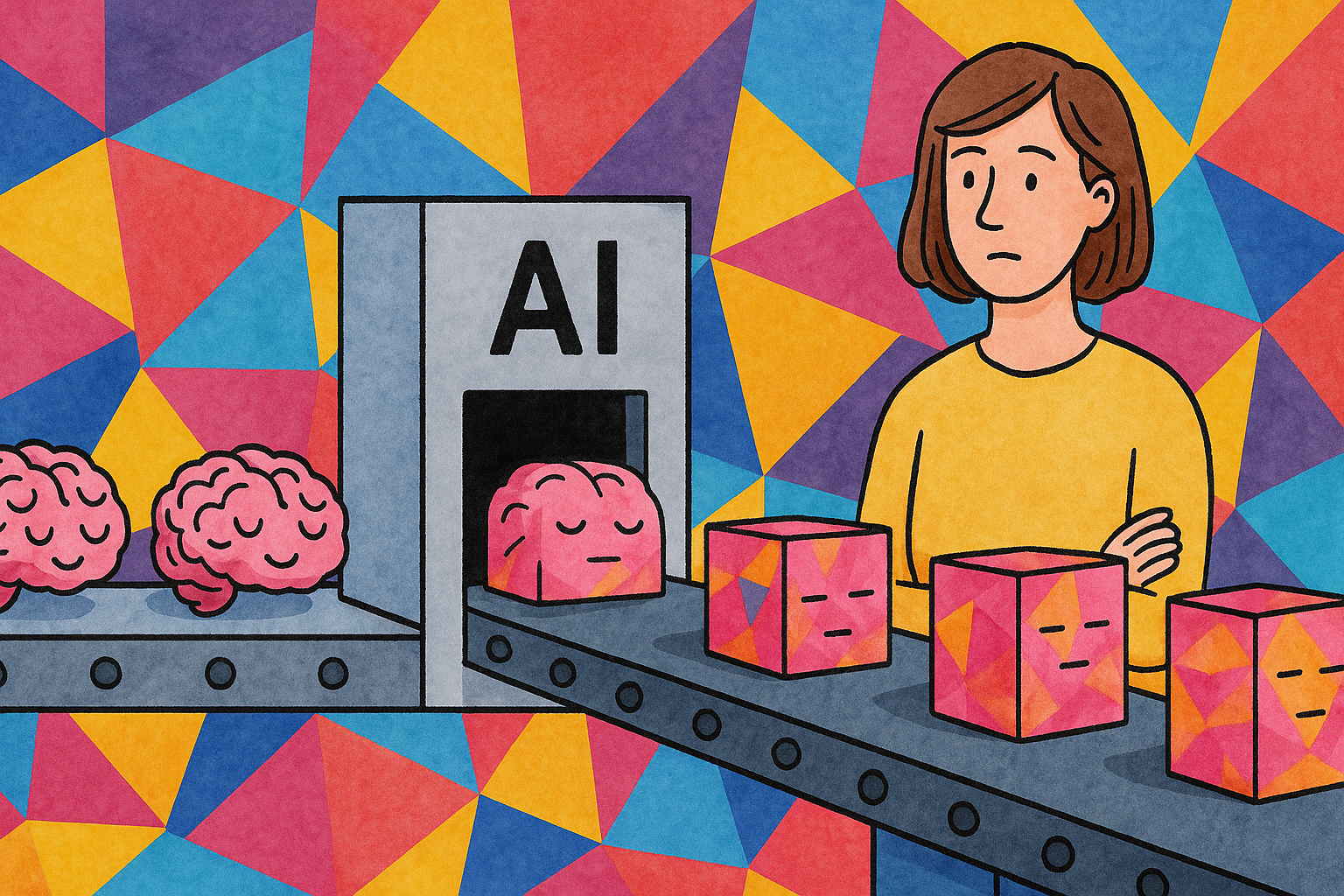Automating the Wrong Things: How We Are Destroying Meaningful Work (And Ourselves)

Introduction (About a Fly on the Wall)
If you know me, you know I’m all about Malcolm Gladwell. He’s my forever hero. I dream of being like him when I grow up.
Lately, during my morning walks with my toddler, I’ve been catching up on his podcast. In one episode, he said something that stuck:
A good storyteller is like a fly on the wall.
They don’t jump into the action. They observe. They sit quietly on the sidelines — not too close, not too far — and that distance gives them perspective. The kind of perspective that makes patterns visible and turns noise into insight.
Now, I’m not claiming to be a great storyteller (let’s be honest, Gladwell is a unicorn). But that idea hit me. Because for the past few years, I’ve been just that: a fly on the wall. I stopped writing. I stepped back from LinkedIn. I didn’t try to keep up. I just watched.
And here’s what I’ve seen: Everyone’s talking about AI. A little about burnout, employee engagement, and the mental health crisis. (Also: anti-aging, GLP-1s, the em dash, and the slow death of Elon Musk — but I digress.)
But there’s something no one seems to be asking and talking about: Why are we really implementing AI, and what are the consequences of these changes to our emotional health and mental well-being?
We’re automating faster than we’re thinking.
We’re automating because we can, because everyone else is doing it, and because AI experts advise us that we must, spreading fear-provoking messages everywhere they go. And in the process, we’re starting to strip out the very things that make work feel worthwhile.
That’s a problem that no one seems to be noticing, or at least talking about. So let’s talk about it.
Why We Work — And Why That Matters
Let’s get one thing out of the way: yes, people work for money. But that’s never been the whole story. Not even close.
Work does a lot of emotional and psychological heavy lifting. It structures our days. It gives us something to wake up for, something to contribute to — and if we’re lucky, something to be proud of. It shapes who we are. When work challenges us and helps us grow, it makes us feel proud and fulfilled through the process of learning and building mastery. Work is where many adults find community.
Work is not just what we do. It’s where meaning lives.
Now, of course, the extent to which work gives our lives meaning depends on the type of work we do — how well it’s aligned with our values, how appreciated we feel, and the type of people we work with. But I don’t think I have to convince anyone that having a meaningful job that fulfills you is much better than the alternative. Take it from a 2011 me: a life-sucking, boring job misaligned with your predispositions leaves you feeling depressed, anxious, and numb.
And this isn’t just philosophy — it’s backed by decades of behavioral science. Self-Determination Theory shows that we thrive when three core needs are met:
- When we feel like we have a say in what we do.
- When we believe we’re good at something and getting better.
- When we feel like we’re part of something bigger than ourselves.
Adam Grant’s research reinforces this. He found that people are more motivated and resilient when they can see the impact of their work — especially when that impact is on someone else. It’s not just about completing a task. It’s about knowing it mattered.
And then there’s Brené Brown, who puts it bluntly: “Unused creativity is not benign. It metastasizes. It turns into grief, rage, judgment, sorrow, shame.” When we lose the opportunity to contribute in a meaningful, creative way, we don’t just disengage. We suffer. The emotional cost of meaningless work is real.
The bottom line is: We need meaning in our work if we want to feel good — and stay well. We should be designing for it. Seeking it. Protecting it. But right now, with the way we’re implementing AI, it seems like we’re doing just the opposite. We’re blindly chasing efficiency without asking: What kind of world are we building?
Before Automating, Know Why You Work
This is not about resisting AI. Because yes, AI can do a lot of impressive things. It can save time. Reduce costs. Generate content. Answer emails.
The problem isn’t automation. The problem is automation without intention. Too many companies are charging ahead, asking, “How do we optimize with AI?” when the better question is, “What makes work worth doing?”
Simpler, faster, easier, and more convenient isn’t always better. A life devoid of challenge and accomplishment is also devoid of meaning (but more on that in the next post).
An Economic Perspective
From an economic perspective, blind AI implementation is bad strategy. We’re looking only at selected benefits — faster output, lower costs, cleaner workflows — without accounting for the hidden costs. Behavioral economics calls these “negative externalities”: hidden downsides that show up later, when it’s harder to fix them. Things like disengagement. Burnout. Turnover. The slow collapse of culture.
When you kill meaningful work — the kind that makes people feel proud, connected, and capable — you’re not just automating tasks. You’re eroding the very things that drive motivation, fulfillment, and meaning.
This isn’t dystopia. It’s a business strategy with a blind spot — the kind that happens when we follow the tech without questioning the trade-offs. And the damage won’t show up in your quarterly metrics. It’ll show up in your culture, in rising inequality, and in the mental health crisis we’ll be left cleaning up.
A Smarter Way Forward
Before we go any further, I want to remind you of two things:
- You don’t have to do something just because someone is telling you that you should. It’s called being a grown-up.
(Please let that sink in.) - You get to decide what’s best for you, and your company, based on your circumstances, objectives, needs, values, and priorities.
Not based on tech trends. Not because someone on LinkedIn said it’s the future.
If you want to implement AI in a way that protects what matters — your people’s energy, identity, and well-being — then you must lead with questions that dig beneath the surface.
So what to do?
1. Run a meaning audit.
Identify what specific jobs people at your company do that create meaning for them. Get specific. The answers will differ depending on your industry and each person’s responsibilities. When do people feel proud of their work? When do they feel unappreciated or invisible? What makes them feel like they matter?
2. Once you know what creates meaning, decide what to automate.
Only automate drudgery — not creativity, contribution, or meaningful challenges that promote growth and accomplishment. If a task drains meaning from the day, go ahead and automate it. If a task builds growth, pride, or connection, don’t. Even if others are doing it; even if AI experts are telling you that you should; and even if it might save you some money in the short term.
If in doubt, err on the side of caution.
3. Track what matters.
Start redefining what performance looks like in a post-AI world. Because what gets measured gets protected. And right now, we’re not measuring the things most at risk. Consider new KPIs that will help you monitor and build meaningful working conditions at your company.Such KPIs can include:
- Purpose and contribution: Do employees feel their work matters? Can they see how their efforts connect to a larger outcome or goal?
- Autonomy: How much of their workday do employees feel they have real control over?
- Growth velocity: Are people being stretched in ways that build confidence and mastery (in a balanced way, without being run down, abused, and overused)
- Creativity: Are there regular opportunities for original thinking, input, or expression?
- Belonging per hour: Are people feeling connected, included, and valued throughout their day?
- Psychological safety: Do people feel safe speaking up, sharing concerns, or questioning automation decisions?
Adjust these KPIs to fit your context. Not every job can deliver all components of meaningful work. And let’s be honest: not every job today is meaningful to begin with, AI or not. That’s okay. The goal is progress (or no regression, depending on your starting point), not perfection.
Use these metrics not just to protect meaning where it exists, but to build more of it, with or without AI in the picture. You might be surprised how small shifts in autonomy, recognition, or connection can transform a job from draining to fulfilling.
4. Consider appointing a Chief Meaning Officer (or, if you want something more human, a Purpose Protection Partner).
Change is hard. I could write an entire blog post about resistance to change. And diffusion of responsibility is real. If no one is responsible for leading this change, it’ll get lost in the million everyday tasks, urgent fires to put out, and short-term revenue projects.
Assign a person — high up enough in the company hierarchy that they actually have real impact — to ask the question no one else is asking in your AI strategy meetings: “This automation saves time. But what does it cost?”
A Final Note
We all like to think it won’t happen to us. A 2023 Pew Research study found that while most Americans believe AI will have a dramatic impact on workers in general, they don’t think it will affect them personally. It’s a cognitive blind spot: we underestimate how it will affect us, and overestimate its impact on others.
“That’s for other people — the ones with repetitive jobs.”
“My role is creative, strategic, human… It’s safe.”
“I like my job. It has meaning. Surely no one would touch that.”
But history suggests otherwise. When new technologies arrive, they move slowly — until they don’t. We saw it with electricity. The internet. Smartphones. The curve looks gradual… until it isn’t. AI is no different.
And it’s often the middle-layer jobs that vanish first. Those with just enough complexity to feel valuable and just enough structure to be programmable. Bookkeepers. HR generalists. Marketing associates. Roles built on process, pattern recognition, and sound judgment.
And here’s the part no one wants to say out loud: If we keep going this way, we could wake up in a world where 30–40% of the population is unemployable. Assume you'll be one of those people. Assume you're one of the unemployable ones. Not because you aren’t capable, but because we automated the very roles that give us dignity, income, and identity — and we did it without thinking twice.
This isn’t science fiction. It’s a systems failure in slow motion.
Let’s not commit meaning-at-work suicide in the name of efficiency, progress, and ego only. Let’s say yes to the tools that serve us — and have the guts to say no to the ones that don’t.
It really doesn't take a full-scale revolution to change the course of a company. It just takes one visionary with guts and a loud enough voice. Make it yours.





